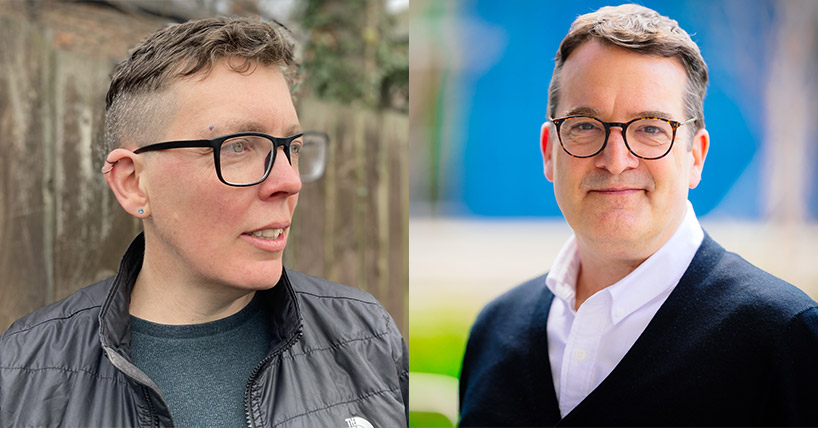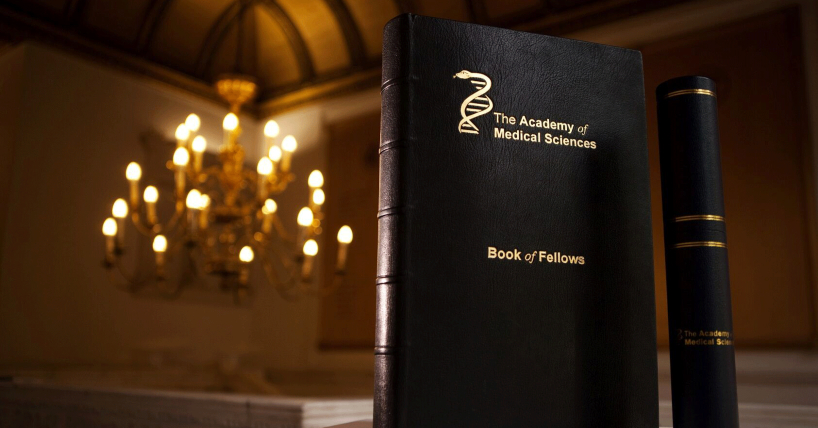AMS Fellowship
Prestigious academy elects leading scientists to its Fellowship
Published on: 22 May 2025
The Academy of Medical Sciences has elected two prominent Newcastle University academics to its Fellowship.
Professors Clare Bambra and Rob Taylor have been recognised for their remarkable contributions to advancing medical science, groundbreaking research discoveries and translating developments into benefits for patients and the wider public.
Their work exemplifies the Academy’s mission to create an open and progressive research sector that improves health for everyone.

‘Reducing health inequalities’
Professor Bambra’s research focuses on understanding and reducing health inequalities, and she gave expert evidence about this to the UK COVID-19 Public Inquiry.
She is an Elected Member of the German National Academy of Sciences Leopoldina; an Elected Fellow of the UK Faculty of Social Sciences; an Honorary Fellow of the UK Faculty of Public Health; and an NIHR Senior Investigator.
Professor Bambra is a founding co-Director of Health Equity North and leads a number of large research collaborations, including a Wellcome Trust funded project examining the North South health divide.
Internationally, she is a member of WHO Europe's Scientific Advisory Group on Health Equity and a senior investigator in CHAIN: The Centre for Global Health Inequalities Research at the Norwegian University of Science and Technology.
Professor Bambra has more than 20 years’ teaching experience and regularly supervises Masters dissertations and PhDs on the topic of health inequalities.
She said: “I am delighted to be made a fellow of the Academy of Medical Sciences.
“I want to thank my colleagues at Newcastle University, and across the wider North East health and care system, who have helped me achieve this.”
‘Human mitochondrial disorders’
Professor Taylor is Professor of Mitochondrial Pathology, using biochemical, genomic and cell biological tools to diagnose and characterise the molecular pathology associated with human mitochondrial disorders.
Mitochondrial disorders are a group of conditions that affect how mitochondria – the batteries of cells – work in the body, with these conditions affecting almost any organ of the body.
The aim of Professor Taylor’s research is to understand the mechanisms of these diseases and benefit patient care through the development of treatments and provision of accurate genetic advice.
His work is wide-ranging and has international status. He is Head of the Newcastle NHS Highly Specialised Mitochondrial Diagnostic Laboratory, Consultant Clinical Scientist at Newcastle upon Tyne Hospitals NHS Foundation Trust and Scientific Director of the North East and Yorkshire Genomic Laboratory Hub.
Professor Taylor said: “Newcastle University has a long and proud history of mitochondrial research excellence, standing on the shoulders of many excellent scientists and clinicians who have set the standard for the current team at Newcastle.
“I’m thrilled to be honoured by this award, which reflects the dedication and expertise of all my academic and NHS colleagues in the Mitochondrial Research Group, who care for patients and families with mitochondrial disease.
“Our teams work tirelessly to enhance the diagnosis of these conditions and determine underlying biological disease mechanisms to support our quest for curative treatments.”
‘Exceptional biomedical and health scientists’
The Academy of Medical Sciences has elected 54 exceptional biomedical and health scientists to its prestigious Fellowship.
The expertise of Fellows elected spans a wide range of clinical and non-clinical disciplines, from infectious disease and stem cell biology to veterinary medicine and dementia research.
They join an esteemed Fellowship of 1,450 researchers who are at the heart of the Academy’s work, which includes nurturing the next generation of scientists and shaping research and health policy in the UK and worldwide.
This year’s cohort reflects the Academy’s ongoing commitment to promoting equality, diversity and inclusion within its Fellowship.
Among the new Fellows, 41% are women. Black, Asian and minority ethnic representation has reached 20% as the Academy continues working on improving the diversity of its Fellowship.
Professor Andrew Morris, CBE FRSE PMedSci, President of the Academy of Medical Sciences, said: “It is a privilege to welcome these 54 exceptional scientists to our Fellowship.
“Each new Fellow brings unique expertise and perspective to addressing the most significant health challenges facing society.
“Their election comes at a crucial time when scientific excellence and collaboration across disciplines are essential for addressing global health challenges both now and in the future.
“We look forward to working with them to advance biomedical research and create an environment where the best science can flourish for the benefit of people everywhere.”
The new Fellows will be formally admitted to the Academy at a ceremony on Wednesday 9 July 2025.




